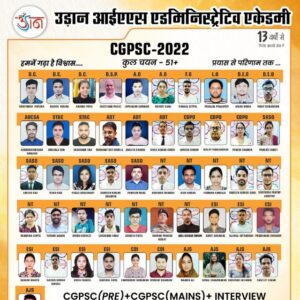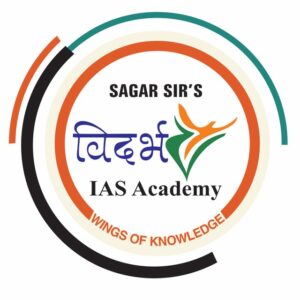
Officers IAS Academy – Study Group
Officers IAS Academy’s official Telegram group
Recent Posts
Answer: B
Explanation
● The Financial Services Institutions Bureau has been constituted effective from July 01, 2022, as an autonomous body of Government of India.
● It replaced the Banks Board Bureau (BBB).
● FSIB’s mandate is recommending persons for appointment as whole-time directors and non-executive chairpersons on the Board of Public Sector Banks (PSBs), Public Sector Financial Institutions (FIs) and Public Sector Insurance Companies (PSIs) and recommend measures to improve Corporate Governance in these Institutions. Hence, statement 1 is correct.
● FSIB is headed by a chairman, a central government nominee. Hence, statement 2 is incorrect.
● Other functions of the Bureau are :-
○ To advise the Government on matters relating to appointments, transfer or extension of term of office and termination of services of the said directors;
○ To advise the Government on the desired management structure at the Board level for PSBs, FIs and PSIs;
○ To build a databank containing data related to the performance of PSBs, FIs and PSIs;
○ To advise the Government on formulation and enforcement of a code of conduct and ethics for whole-time directors in PSBs, FIs and PSIs; Hence, statement 3 is correct.
○ To advise the Government on evolving suitable training and development programmes for management personnel in PSBs, FIs and PSIs
Explanation
● The Financial Services Institutions Bureau has been constituted effective from July 01, 2022, as an autonomous body of Government of India.
● It replaced the Banks Board Bureau (BBB).
● FSIB’s mandate is recommending persons for appointment as whole-time directors and non-executive chairpersons on the Board of Public Sector Banks (PSBs), Public Sector Financial Institutions (FIs) and Public Sector Insurance Companies (PSIs) and recommend measures to improve Corporate Governance in these Institutions. Hence, statement 1 is correct.
● FSIB is headed by a chairman, a central government nominee. Hence, statement 2 is incorrect.
● Other functions of the Bureau are :-
○ To advise the Government on matters relating to appointments, transfer or extension of term of office and termination of services of the said directors;
○ To advise the Government on the desired management structure at the Board level for PSBs, FIs and PSIs;
○ To build a databank containing data related to the performance of PSBs, FIs and PSIs;
○ To advise the Government on formulation and enforcement of a code of conduct and ethics for whole-time directors in PSBs, FIs and PSIs; Hence, statement 3 is correct.
○ To advise the Government on evolving suitable training and development programmes for management personnel in PSBs, FIs and PSIs
5. With reference to the Financial Services Institutions Bureau (FSIB), consider the following statements.
1) FSIB recommends persons for appointment as directors of Public Sector Banks.
2) FSIB is headed by the Governor of Reserve Bank of India.
3) It also advises the Government on evolving suitable training and development programmes for management personnel in Public Sector Banks.
1) FSIB recommends persons for appointment as directors of Public Sector Banks.
2) FSIB is headed by the Governor of Reserve Bank of India.
3) It also advises the Government on evolving suitable training and development programmes for management personnel in Public Sector Banks.
Answer: A
Explanation
● Foreign Portfolio Investment (FPI) means investing in the financial assets of a foreign country, such as stocks or bonds available on an exchange.
● It does not provide the investor with direct ownership of a company's assets.
● FPI is often referred to as “hot money” because of its tendency to flee at the first signs of trouble in an economy. Hence, answer is option A.
Explanation
● Foreign Portfolio Investment (FPI) means investing in the financial assets of a foreign country, such as stocks or bonds available on an exchange.
● It does not provide the investor with direct ownership of a company's assets.
● FPI is often referred to as “hot money” because of its tendency to flee at the first signs of trouble in an economy. Hence, answer is option A.
4. Consider the following factors.
Statement -I:
Foreign Portfolio Investment (FPI) is often referred to as “hot money”.
Statement -II:
It tends to flee at the first signs of trouble in an economy.
Statement -I:
Foreign Portfolio Investment (FPI) is often referred to as “hot money”.
Statement -II:
It tends to flee at the first signs of trouble in an economy.
Answer: A
Explanation
● Launched in 2015 to promote entrepreneurship, Pradhan Mantri Mudra Yojana (PMMY) provides loans upto Rs. 10 lakh to the non-corporate, non-farm small/micro enterprises. Hence, statement 1 is correct.
● PMMY aims to “fund the unfunded” by bringing such enterprises to the formal financial system and extending affordable credit to them.
● Under PMMY collateral free loans of upto Rs. 10 Lakh are extended by Member Lending Institutions (MLIs) viz Scheduled Commercial Banks, Regional Rural Banks (RRBs), Small Finance Banks (SFBs), Non Banking Financial Companies (NBFCs), Micro Finance Institutions (MFIs) etc. Hence, statement 2 is correct and statement 3 is incorrect.
● The loans are given for income generating activities in manufacturing, trading and services sectors and for activities allied to agriculture.
● Mudra loans are offered in four categories namely, ‘Shishu’, ‘Kishore’, ‘Tarun’ and ‘Tarun Plus’ which signifies the stage of growth or development and funding needs of the borrowers:-
○ Shishu : covering loans upto Rs. 50,000/-
○ Kishore : covering loans above Rs. 50,000/- and upto Rs. 5 lakh
○ Tarun : covering loans above Rs. 5 lakh and upto Rs. 10 lakh.
○ Tarun Plus: covering loans above Rs. 10 lakh and upto Rs. 20 lakh. (would be available to entrepreneurs who have availed and successfully repaid previous loans under the Tarun category)
● With an objective to promote entrepreneurship among the new generation aspiring youth, it is ensured that more focus is given to Shishu Category loans and then Kishore and Tarun categories.
Explanation
● Launched in 2015 to promote entrepreneurship, Pradhan Mantri Mudra Yojana (PMMY) provides loans upto Rs. 10 lakh to the non-corporate, non-farm small/micro enterprises. Hence, statement 1 is correct.
● PMMY aims to “fund the unfunded” by bringing such enterprises to the formal financial system and extending affordable credit to them.
● Under PMMY collateral free loans of upto Rs. 10 Lakh are extended by Member Lending Institutions (MLIs) viz Scheduled Commercial Banks, Regional Rural Banks (RRBs), Small Finance Banks (SFBs), Non Banking Financial Companies (NBFCs), Micro Finance Institutions (MFIs) etc. Hence, statement 2 is correct and statement 3 is incorrect.
● The loans are given for income generating activities in manufacturing, trading and services sectors and for activities allied to agriculture.
● Mudra loans are offered in four categories namely, ‘Shishu’, ‘Kishore’, ‘Tarun’ and ‘Tarun Plus’ which signifies the stage of growth or development and funding needs of the borrowers:-
○ Shishu : covering loans upto Rs. 50,000/-
○ Kishore : covering loans above Rs. 50,000/- and upto Rs. 5 lakh
○ Tarun : covering loans above Rs. 5 lakh and upto Rs. 10 lakh.
○ Tarun Plus: covering loans above Rs. 10 lakh and upto Rs. 20 lakh. (would be available to entrepreneurs who have availed and successfully repaid previous loans under the Tarun category)
● With an objective to promote entrepreneurship among the new generation aspiring youth, it is ensured that more focus is given to Shishu Category loans and then Kishore and Tarun categories.
3. With reference to the Pradhan Mantri Mudra Yojana (PMMY), consider the following statements.
1) PMMY provides loans to the non-corporate, non-farm small/micro enterprises.
2) The loans are awarded on a collateral-free basis.
3) Under PMMY, loans are extended only by Regional Rural Banks (RRBs)
1) PMMY provides loans to the non-corporate, non-farm small/micro enterprises.
2) The loans are awarded on a collateral-free basis.
3) Under PMMY, loans are extended only by Regional Rural Banks (RRBs)
Answer: B
Explanation:
● The Government of India has been promoting organic farming in the country through a dedicated scheme namely Paramparagat Krishi Vikas Yojana (PKVY) since 2015-16. Hence, statement 1 is correct.
● The scheme stresses on end to end support to organic farmers i.e from production to certification and marketing. Hence, statement 2 is correct.
● Under PKVY, farmers are provided financial assistance of Rs 50,000 per hectare/3 years.
● The scheme promotes the Participatory Guarantee System (PGS) for India (PGS-India) form of organic certification that is built on mutual trust, locally relevant and mandates the involvement of producers and consumers in the process of certification. PGS–India operates outside the framework of Third Party Certification. Hence, statement 3 is incorrect.
○ The National Programme for Organic Production (NPOP) ensures that products grown without chemical fertilizers and pesticides can be certified and recognized not only in the domestic market but also for export, particularly to the EU and Switzerland.
○ The NPOP has been officially acknowledged by international bodies, thereby enhancing the acceptance of Indian organic products globally.
Funding Pattern:
● Funding pattern under the scheme is in the ratio of 60:40 by the Central and State Governments respectively.
● In case of North Eastern and Himalayan States, Central Assistance is provided in the ratio of 90:10 (Centre: State) and for Union Territories, the assistance is 100%.
Explanation:
● The Government of India has been promoting organic farming in the country through a dedicated scheme namely Paramparagat Krishi Vikas Yojana (PKVY) since 2015-16. Hence, statement 1 is correct.
● The scheme stresses on end to end support to organic farmers i.e from production to certification and marketing. Hence, statement 2 is correct.
● Under PKVY, farmers are provided financial assistance of Rs 50,000 per hectare/3 years.
● The scheme promotes the Participatory Guarantee System (PGS) for India (PGS-India) form of organic certification that is built on mutual trust, locally relevant and mandates the involvement of producers and consumers in the process of certification. PGS–India operates outside the framework of Third Party Certification. Hence, statement 3 is incorrect.
○ The National Programme for Organic Production (NPOP) ensures that products grown without chemical fertilizers and pesticides can be certified and recognized not only in the domestic market but also for export, particularly to the EU and Switzerland.
○ The NPOP has been officially acknowledged by international bodies, thereby enhancing the acceptance of Indian organic products globally.
Funding Pattern:
● Funding pattern under the scheme is in the ratio of 60:40 by the Central and State Governments respectively.
● In case of North Eastern and Himalayan States, Central Assistance is provided in the ratio of 90:10 (Centre: State) and for Union Territories, the assistance is 100%.
2. With reference to Paramparagat Krishi Vikas Yojana (PKVY), consider the following statements.
1) PKVY aims at promoting organic farming in the country.
2) The scheme focuses on end to end support to organic farmers.
3) The scheme promotes the National Programme for Organic Production (NPOP) form of organic certification.
1) PKVY aims at promoting organic farming in the country.
2) The scheme focuses on end to end support to organic farmers.
3) The scheme promotes the National Programme for Organic Production (NPOP) form of organic certification.
Answer: D
Explanation
About the Mission
● Launched in 2020, Mission Karmayogi is a nationwide programme to lay the foundation for capacity building of civil servants. Hence, answer is option D.
● Officially called the "National Programme for Civil Services Capacity Building (NPCSCB)", the mission plans to transform human resource management in the country.
● Mission Karmayogi aims to prepare the Indian civil servants for the future by making them more creative, constructive, imaginative, innovative, proactive, professional, progressive, energetic, enabling, transparent and technology-enabled.
● The fundamental focus of the reform is the creation of a ‘citizen centric civil service’ capable of creating and delivering services conducive to economic growth and public welfare.
● It shifts the focus from “Rule based training to Role based training”. Greater thrust has been laid on behavioral change.
● NPCSCB will be governed by the Prime Minister’s Human Resource Council, which will also include state Chief Ministers, Union Cabinet ministers and experts. This council will approve and review civil service capacity building programmes.
iGOTKarmayogi
● The Mission Karmayogi programme is delivered by the digital platform called iGOTKarmayogi.
● The platform enables officials to explore, acquire and certify their competencies that are critical to discharging their duties.
Explanation
About the Mission
● Launched in 2020, Mission Karmayogi is a nationwide programme to lay the foundation for capacity building of civil servants. Hence, answer is option D.
● Officially called the "National Programme for Civil Services Capacity Building (NPCSCB)", the mission plans to transform human resource management in the country.
● Mission Karmayogi aims to prepare the Indian civil servants for the future by making them more creative, constructive, imaginative, innovative, proactive, professional, progressive, energetic, enabling, transparent and technology-enabled.
● The fundamental focus of the reform is the creation of a ‘citizen centric civil service’ capable of creating and delivering services conducive to economic growth and public welfare.
● It shifts the focus from “Rule based training to Role based training”. Greater thrust has been laid on behavioral change.
● NPCSCB will be governed by the Prime Minister’s Human Resource Council, which will also include state Chief Ministers, Union Cabinet ministers and experts. This council will approve and review civil service capacity building programmes.
iGOTKarmayogi
● The Mission Karmayogi programme is delivered by the digital platform called iGOTKarmayogi.
● The platform enables officials to explore, acquire and certify their competencies that are critical to discharging their duties.
1. Mission Karmayogi is a/an
Officer's Daily Motivation
#officersiasacademy#motivation#success#upsc
#officersiasacademy#motivation#success#upsc
Last Batch for UPSC 2025 – Your Final Chance to Succeed!
This is it! The LAST batch of the year at Officers IAS Academy starts on November 15, 2024! Don’t wait, your dream career awaits:
One-on-One Mentorship with ex-IAS Officers
Online & Offline Learning Options
Weekly Tests to keep you sharp
Seats are LIMITED – secure yours NOW and get a head start on your UPSC 2025 journey!
Kindly fill the form to ensure your Admission- https://forms.gle/eKiF22b674nXryEVA
This is it! The LAST batch of the year at Officers IAS Academy starts on November 15, 2024! Don’t wait, your dream career awaits:
One-on-One Mentorship with ex-IAS Officers
Online & Offline Learning Options
Weekly Tests to keep you sharp
Seats are LIMITED – secure yours NOW and get a head start on your UPSC 2025 journey!
Kindly fill the form to ensure your Admission- https://forms.gle/eKiF22b674nXryEVA
Answer: D
Explanation
Justice Puttaswamy Vs Union of India case - Right to Privacy was recognised a fundamental right
National Legal Services Authority Vs Union of India case - Recognised transgenders are equally entitled to the rights in the constitution
Lily Thomas Vs Union of India case - Automatic disqualification of MPs/MLAs in case of conviction with sentence greater than 2 years.
Explanation
Justice Puttaswamy Vs Union of India case - Right to Privacy was recognised a fundamental right
National Legal Services Authority Vs Union of India case - Recognised transgenders are equally entitled to the rights in the constitution
Lily Thomas Vs Union of India case - Automatic disqualification of MPs/MLAs in case of conviction with sentence greater than 2 years.
5. Consider the following landmark judgements
1. Justice Puttaswamy Vs Union of India case - Recognised that transgenders are equally entitled to the rights in the constitution
2. Lily Thomas Vs Union of India case - Right to Privacy was recognised a fundamental right
3. National Legal Services Authority Vs Union of India case - Automatic disqualification of MPs/MLAs in case of conviction with sentence greater than 2 years
1. Justice Puttaswamy Vs Union of India case - Recognised that transgenders are equally entitled to the rights in the constitution
2. Lily Thomas Vs Union of India case - Right to Privacy was recognised a fundamental right
3. National Legal Services Authority Vs Union of India case - Automatic disqualification of MPs/MLAs in case of conviction with sentence greater than 2 years





